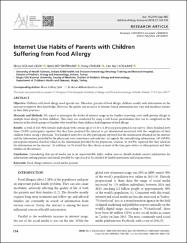| dc.contributor.author | Kulhas Çelik, İlknur | |
| dc.contributor.author | Büyüktiryaki, Betül | |
| dc.contributor.author | Civelek, Ersoy | |
| dc.contributor.author | Kocabaş, Can Naci | |
| dc.date.accessioned | 2020-11-20T14:43:02Z | |
| dc.date.available | 2020-11-20T14:43:02Z | |
| dc.date.issued | 2019 | |
| dc.identifier.issn | 1308-9234 | |
| dc.identifier.uri | https://doi.org/10.21911/aai.485 | |
| dc.identifier.uri | https://app.trdizin.gov.tr//makale/TXpZd05URXlNZz09 | |
| dc.identifier.uri | https://hdl.handle.net/20.500.12809/1142 | |
| dc.description | WOS: 000504849100004 | en_US |
| dc.description.abstract | Objective: Children with food allergy need special care. Therefore, parents of food allergic children usually seek information on the internet to improve their knowledge. However, the quality and accuracy of internet-based information may vary and misdirect parents in their daily practices. Materials and Methods: We aimed to investigate the habits of internet usage in the families reporting cow's milk protein allergy or multiple food allergy in their children. This study was conducted by using a web-based questionnaire that can be completed on the Internet in Facebook groups of families who stated that their children had diagnosis of food allergy. Results: A total of 458 (96% female) individuals with a mean age of 32.03 +/- 4.49 years participated in our survey. Three hundred forty three (74.9%) participants reported that they have preferred the internet to get information associated with the complaints of their children before seeing a physician. Two hundred ninty five (64.4%) participants reported that the information obtained on the internet and the information provided by the physicians were sometimes contradictory. As regards the contradicting information, 147 (49.8%) participants reported that they relied on the information provided by the physicians, whereas, 43 (14.9%) reported that they relied on the information on the internet. In addition, 44.3% stated that they always or most of the time gave advice to other patients and their families on the internet. Conclusion: Considering that social media use is an unpreventable habit, online sources should include correct information for information-seeking parents and should possibly be supervised or be certified by health institutions and organizations. | en_US |
| dc.item-language.iso | eng | en_US |
| dc.publisher | Bilimsel Tip Yayinevi | en_US |
| dc.item-rights | info:eu-repo/semantics/openAccess | en_US |
| dc.subject | Food Allergy | en_US |
| dc.subject | Internet | en_US |
| dc.subject | Social Media | en_US |
| dc.subject | Parents | en_US |
| dc.title | Internet Use Habits of Parents with Children Suffering from Food Allergy | en_US |
| dc.item-type | article | en_US |
| dc.contributor.department | MÜ,Tıp Fakültesi, Dahili Tıp Bilimleri Bölümü | en_US |
| dc.contributor.institutionauthor | Kocabaş, Can Naci | |
| dc.identifier.doi | 10.21911/aai.485 | |
| dc.identifier.volume | 17 | en_US |
| dc.identifier.issue | 3 | en_US |
| dc.identifier.startpage | 134 | en_US |
| dc.identifier.endpage | 139 | en_US |
| dc.relation.journal | Astim Allerji Immunoloji | en_US |
| dc.relation.publicationcategory | Makale - Uluslararası Hakemli Dergi - Kurum Öğretim Elemanı | en_US |


















